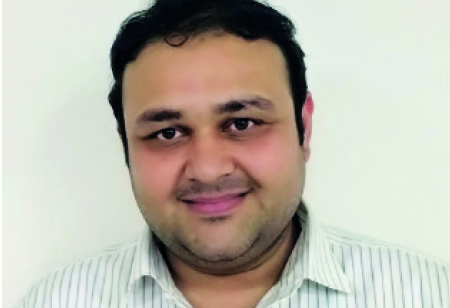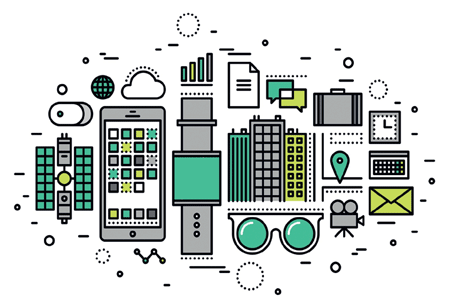
IT to IoT: A Paradigm Shift for Thousands of Professionals in Indian IT Industry


Arzan Amaria, Senior Solution Architect, Cloud That Technologies
Digital Transformation is changing the face of almost everything around us. Few years down the line, when you will visit some local retail store you will go and pickup some veggies, spices and chocolates, put it in your bag and just move out as if it’s your kitchen store room. To make this possible, India will need a huge army of developers & technology professionals who can deal with technologies like Computer Vision, VR, AR, Embedded, Sensor Integration, Analytics, Cloud, Edge Computing and the list is never ending. There is a very big question posed on the Indian educational system.
Does India have enough engineers who can make the digital transformation story work effectively in time?
A short answer to this question is yes. But before celebrating the success, thousands of professionals in IT industry today must become a part of the industrial revolution which is steadily making its move.
Does Adding an 'o' Matter in IT?
Though we know the abbreviation of IoT is simply ‘Internet of Things,’I believe the ‘o’ represents the Operational Technologies. IoT defines the marriage of information technology(IT) with Operational technology(OT). The growing technology trend expects the technology professionals to help solve some real-life problem or bring some magical effect in the typical business workflow. Any IT professional who is involved in such projects are expected to know the newer frameworks with great skills to integrate powerful components inside & outside of the IT ecosystem. You can image your life as a software developer few years back when you were hired to code a program which can run or execute a system functionality. Back then, it might not be very essential for you to know the end of the operation cycle where the code could be a ‘small cog in the machine’. Today, if you want to become a successful fullstack developer or architect, not only do you need to know multiple technologies which are responsible for building connected products & solutions but some level of domain knowledge as well. IT professionals who have the skill or ability to deeply think of contributing in an end-to-end solution with a gist of innovation will be the survivors left for celebration.
Playing a role as a Head of IoT training & consulting unit at Cloud That Technologies, I get opportunities to meet hundreds of IT professionals every year. I can find that there are two types of professionals in market. The one who wants to continue using the existing knowledge and expertise with a single software or infrastructure technology and the other comparatively smaller category of people who wants to explore everything to scale limitless and work on extensive technologies and ambitious projects. With a huge demand in market for digital transformation professionals, the smaller group
of people often land themselves with life changing opportunities way sooner than they expect. I would say that who ever understands the importance of ‘o’ which is turning IT to IoT would have a bright future. Currently the best strategy for IT professionals is to add some relevant skills based on their profile and leverage their overall experience. For example, someone who is working as a DBA working on traditional SQL like technology can learn NoSQL technologies like MongoDB and Cassandra. Additional research in managing time series data and showcasing the integration of such NoSQL databases with real life analytics solutions could be very helpful.
What qualities of candidate should be checked-out by employers before hiring for digital transformation projects?
Digital Transformation projects would require a huge work¬force in many cases. Along with the new architect & developer profiles in market like IoT Architects, Device Engineers, Machine Learning Engineers and Data Scientists, the older profiles including Database, Administration and Development professionals are also required in some numbers. Of course, the number of people required in redundant profiles is reducing drastically thanks to cloud computing, DevOps and AI.
The selection of right candidates for startups becomes much more critical as most of the times they are expected to handle multiple roles & responsibilities and it is very tough to replace them. While looking at the profile of any potential candidate, an employer should make sure that not only the technical skills are up to the mark but few other qualities should also be checked for. Any professional hired for Digital Transformation project must be innovative and come with a mindset of a researcher. I can say this with my experience that it is very difficult to work on niche technologies with little support demanding a lot of patience with multiple trial & errors. If an employer is not very lucky to get someone from the second category of professionals as per my definition above, then it will be a hard time to deliver. So, the candidate with fire in his eyes to dig through any amount of mud & stones to get the solution ready would be the best choice.

The candidate should possess some valuable certifications which are recently achieved. For senior profiles having years of experience, there should be certifications achieved at regular intervals of time. This is a very big indication that there is a constant touch with technology. It is only the love towards technology and ambitious nature which builds enough will power to help a company bring a successful product or service in the market. Losing such rock stars is not feasible!
Finally, the candidate must have multiple technical skills. It is good to be an expert at something but it is very essential to have knowledge in various aspects. A cloud architect or IoT architect’s ability lies in developing solutions on multiple platforms. An embedded engineer is respected when he shows his work on multiple controllers and processors. Similarly, a developer is extremely useful who has experiencing of getting his hands dirty with multiple programming languages. Multi-concept professionals are the need of the hour. That’s why I always say ‘Master of one, Jack of all’.
What qualities of candidate should be checked-out by employers before hiring for digital transformation projects?
Digital Transformation projects would require a huge work¬force in many cases. Along with the new architect & developer profiles in market like IoT Architects, Device Engineers, Machine Learning Engineers and Data Scientists, the older profiles including Database, Administration and Development professionals are also required in some numbers. Of course, the number of people required in redundant profiles is reducing drastically thanks to cloud computing, DevOps and AI.
The selection of right candidates for startups becomes much more critical as most of the times they are expected to handle multiple roles & responsibilities and it is very tough to replace them. While looking at the profile of any potential candidate, an employer should make sure that not only the technical skills are up to the mark but few other qualities should also be checked for. Any professional hired for Digital Transformation project must be innovative and come with a mindset of a researcher. I can say this with my experience that it is very difficult to work on niche technologies with little support demanding a lot of patience with multiple trial & errors. If an employer is not very lucky to get someone from the second category of professionals as per my definition above, then it will be a hard time to deliver. So, the candidate with fire in his eyes to dig through any amount of mud & stones to get the solution ready would be the best choice.

The candidate should possess some valuable certifications which are recently achieved. For senior profiles having years of experience, there should be certifications achieved at regular intervals of time. This is a very big indication that there is a constant touch with technology. It is only the love towards technology and ambitious nature which builds enough will power to help a company bring a successful product or service in the market. Losing such rock stars is not feasible!
Finally, the candidate must have multiple technical skills. It is good to be an expert at something but it is very essential to have knowledge in various aspects. A cloud architect or IoT architect’s ability lies in developing solutions on multiple platforms. An embedded engineer is respected when he shows his work on multiple controllers and processors. Similarly, a developer is extremely useful who has experiencing of getting his hands dirty with multiple programming languages. Multi-concept professionals are the need of the hour. That’s why I always say ‘Master of one, Jack of all’.
